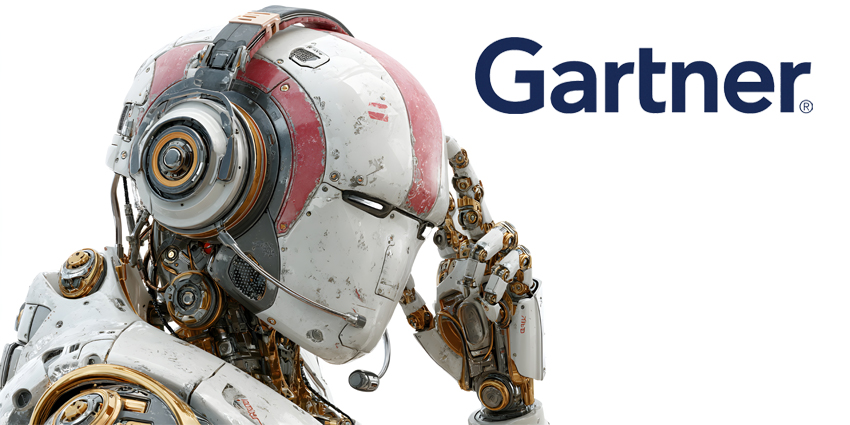The AI Copilot is one of the most exciting innovations in the customer experience landscape, powering a new age of productivity and efficiency in teams.
It builds on the evolving presence of artificial intelligence and machine learning solutions in the contact center, leveraging the opportunities offered by generative AI and LLMs. Countless innovative vendors have already begun highlighting the opportunities these tools provide.
Microsoft has a version of its Copilot assistant for the Dynamics 365 ecosystem. There’s also Microsoft Copilot for Sales, and Microsoft Copilot for Service.
Salesforce is experimenting with a new Copilot solution powered by Einstein. Even Webex is experimenting with innovations in conversational AI tech.
While these AI Copilots may have slightly different features (and names), they’re all designed to augment the modern contact center agent and improve customer interactions. Here’s everything you need to know about the AI Copilot and its impact on the future of CX.
What is an AI Copilot for Customer Experience?
The term “AI Copilot,” or just “Copilot,” used to refer to an AI assistant, was initially coined by Microsoft when unveiling its generative AI assistant for the Microsoft 365 stack. Microsoft chose the name because the solution was designed to support and empower agents, essentially acting as an always-on enterprise assistant.
Today’s AI copilots combine large language models and conversational interfaces to support users in various tasks and decision-making processes. They can understand, analyze, and respond to multiple data types and automate countless tasks.
In the CX or contact center space, the AI Copilot uses innovative AI technology to support customer service, success, and sales agents. These tools can provide context-aware assistance to employees throughout the customer journey, leveraging business data and CRM insights.
They can automatically take notes during calls and conversations, summarize discussions, highlight action points, and even provide intelligent suggestions for improving customer sentiment. Copilots can also help to unify various disparate systems, connecting the data from multiple platforms and tools to offer employees a comprehensive source of guidance.
AI Copilots vs Chatbots vs Virtual Agents: What’s the Difference?
The AI Copilot isn’t the first AI-powered assistant we’ve seen in the contact center. Companies have experimented with chatbots and virtual assistants to help employees with various tasks for years. Chatbots, similar to copilots, combine conversational interfaces with machine learning algorithms and natural language processing capabilities.
They can handle various tasks but are usually designed to support customers through advanced self-service experiences. Chatbots can answer questions, link customers to FAQs, and even provide personalized product recommendations in some cases.
Virtual agents can support consumers and employees with AI, natural language processing, and automation. They often support omnichannel communication and are used to create standard chatbots, voice bots, and interactive voice response systems.
Copilots are an advanced version of both solutions. AI copilots use the latest generative AI technology and large language models to assist with tasks a standard bot or virtual agent couldn’t handle. They can deliver personalized assistance and guidance to teams, learn from user behaviors, and automatically generate content and responses to customer queries.
Typically, AI copilots in the contact center are designed to empower customer service and sales professionals rather than serving customers directly.
How Do AI Copilots Work in the CX Space?
So, how do AI Copilots work? As mentioned above, they’re powered by large language models and generative conversational AI interfaces. Algorithms applied in machine learning, natural language processing, and context understanding enable copilots to operate at an advanced level.
At the same time, through integrations, APIs, and training methods, copilots can be refined and fine-tuned to suit the specific needs of employees in different industries.
Different types of AI Copilots can operate in varying ways. A basic copilot, for instance, will use API calls to LLMs to respond to general inquiries using vast knowledge databases. More advanced copilots, on the other hand, can chain multiple LLMs together and draw data from a company’s existing tools, contact center platforms, CRMs, and databases.
This means some of the most advanced copilots can deliver more contextual responses to requests and learn from business and customer experiences. In virtually every instance, AI Copilots are extremely easy to use. Employees can interact with them using basic text or voice prompts.
These prompts tell the copilot what the agent needs, and it generates a response accordingly. With machine learning and human-in-the-loop feedback, the copilot can be more efficient, accurate, and valuable over time.
The Benefits of AI Copilots in Customer Experience
Generative AI tools have proven extremely useful in various business landscapes. They can help automate mundane tasks, align data systems, and improve team creativity. By 2032, the market for generative AI is expected to reach $191.8 billion!
In the contact center, an AI copilot can help boost team productivity and efficiency, streamline customer interactions, and strengthen brand loyalty.
The right tools can:
Improve agent onboarding and training
Agent churn is a common problem in the contact center, where high turnover rates lead to a constant flow of changing employees. AI can help improve employee retention and prepare new team members to thrive.
An AI Copilot can offer instant access to training resources and data when a new employee joins a team. It can also provide step-by-step coaching and guidance, ensuring new employees adhere to best practices for customer support and sales activities.
Enhance contact center efficiency.
Speed is crucial when delivering excellent customer service. However, employees often struggle with tasks like finding data and troubleshooting problems quickly. An AI Copilot can help agents find solutions faster, rapidly surfacing data from multiple sources on a contact center dashboard.
It can respond to changes in customer sentiment, recognize requests, and deliver constant feedback and guidance through a conversation. This leads to more empowered agents and lower average handling times. Microsoft found companies using its Copilot solution in the contact center reduced handling times by an average of 12%.
Automate repetitive tasks
As customer journeys grow more complex and businesses search for ways to boost productivity and efficiency, automation becomes more critical to the CX stack. An AI Copilot can rapidly reduce the mundane tasks an agent needs to perform daily.
They suggest the ideal times to schedule appointments with sales prospects and generate expertly crafted messages, emails, and other responses in seconds. These tools can rapidly summarize and transcribe conversations, pinpointing crucial action items and trends.
Transform customer experiences
By empowering agents to work more efficiently, an AI copilot can significantly impact customer experience. Not only do these tools help team members resolve problems faster, but they can also assist in personalizing interactions. Drawing information from a CRM or customer database, these tools can help employees build deeper relationships with customers.
Some solutions can even automatically monitor customer sentiment and offer best-practice suggestions to agents when conversations start to go poorly. Plus, they can automate tasks for nurturing customers, like sending follow-up and thank-you messages or emails.
Optimize decision making
Like many AI solutions, copilots are fantastic at collecting, analyzing, and processing data. The information they gather from customer conversations and daily workflows can provide valuable insights to businesses searching for growth.
An AI Copilot can highlight trends, patterns, and opportunities that other team members might have missed when viewing large volumes of data. It can also collect insights from employees, giving businesses an insight into which factors influence productivity and engagement.
Examples of AI Copilots for CX Transformation
As mentioned above, countless vendors are adding Copilot technologies to their contact center platforms and CX tools. Perhaps the most well-known example is Microsoft’s “Copilot” solution. This generative AI tool appears throughout the Microsoft portfolio today. There are tools for sales teams and a dedicated copilot solution for Microsoft Dynamics.
Plus, Microsoft announced Microsoft Copilot for Sales, and Microsoft Copilot for Service at Ignite 2023.
With Microsoft’s Copilot technology, agents can rapidly summarize and transcribe meetings, access customer insights, and leverage real-time coaching and support.
Other solutions that have begun to emerge in the last year include:
- NICE Enlighten Copilot: The NICE Enlighten toolkit includes a range of generative AI solutions built into the CXOne platform. There are tools for automatic summarization, bots designed to help sales professionals excel, and even features for personalized coaching.
- Salesforce Einstein Copilot: Announced alongside Einstein 1, the next generation of Salesforce’s AI-powered platform, Einstein Copilot is a powerful personal assistant. It can automatically complete tasks for agents, surface information, and generate content.
- Cirrus Copilot: Providing contact centers in the UK with a ChatGPT AI assistant, Cirrus Copilot accompanies a range of powerful tools from the Cirrus brand. The solution features all of the intelligent capabilities of a gen-AI-powered assistant for CX teams.
Other vendors are also getting involved. SAP recently introduced a natural language copilot named “Joule,” which will soon be embedded into the company’s cloud portfolio. Zoom also has its AI Companion solution and the “Zoom Revenue Accelerator” for sales teams.
The Future of AI Assistants in the Contact Center
The AI Copilot has proven to be one of the most impressive new tools in the CX space, empowering companies and teams to delight customers like never before. As AI technology, LLMs, and contact center platforms evolve, the collaboration between humans and machines will grow.
In the years ahead, we can expect countless organizations to embrace AI Copilots to power team productivity and efficiency while enhancing customer satisfaction scores. However, it’s worth noting that AI Copilots aren’t miracle workers.
No matter how advanced, AI will never completely replace the need for human employees capable of demonstrating true creativity and empathy. The AI Copilot aims to support, empower, and augment employees, not eliminate them.
Additionally, not all Copilots are the same. The right solution for you will need to combine scalability and intelligence with exceptional security and compliance. Choosing a solution that adheres to your security standards and can leverage enterprise context safely will boost your chances of success.
While there will always be risks and challenges to embracing new technology, the AI Copilot could soon be the new “secret sauce” for the modern contact center team.







